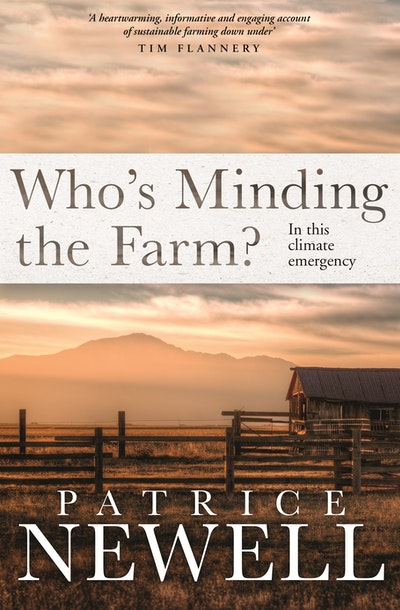Patrice Newell explores humanity’s relationship with the earth itself.
‘We call our planet earth, yet we don’t think much about earth itself,’ Patrice Newell writes in the introduction to Who’s Minding the Farm?. ‘As a proud dirt farmer, I reckon we should have a Minister for Soil. Not just a Minister for the Environment – we’ve plenty of those, at federal and state levels, and they rarely mention soil.’
The destruction and depletion of our soils is among the most alarming human-induced environmental crises we face. As the primary medium in which most of our food is grown, soil quality should be top of the agenda for any discussion about the future of humanity. After all, it holds the key to eliminating poverty and hunger, cleaner waterways, sanitation and good health. So why, in environmental blueprints like the UN’s Sustainable Development Goals, does land management barely rate a mention?
As Newell outlines in Who’s Minding the Farm?, when done right, organic agriculture has the power to heal planet Earth while also feeding its population. As the steward of a small farm in New South Wales’ Hunter Valley herself, over more than three decades she has invested heavily in organic methods. From this unique front-line perspective, she promotes new ways of thinking about the relationship between food and the environment. In the passage below, Newell rejects the destructive model of large-scale Australian agriculture, instead introducing the concept of organic farms as places of healing.
I like to think of our farm, Elmswood, in the Hunter Valley, as an old/modern, small family operation, but it’s still part of a global trade system. And no matter how we strive to do things differently, in a healthier way, there’s no escaping the fact that we’re connected to the farms next door, where our beliefs and practices may not be shared. And those farms are connected to the farms next to them, and to a world of agriculture in crisis. No farmer farms alone. We turn to each other in times of trouble, during drought or when bushfires threaten, and we often turn away from each other when it comes to views on the use of chemicals or climate change. Agricultural chemicals are manufactured synthetic products including pesticides, herbicides, highly soluble fertilisers and are the foundation of modern industrial agriculture. But manufactured synthetic fertilisers aren’t doing the job any more, and plants are resisting herbicides. The whole farming sector needs to do things differently. The International Federation of Agriculture Movements (IFOAM), describes organic agriculture as a ‘production system that sustains the health of soils, ecosystems and people. It relies on ecological processes, biodiversity and cycles adapted to local conditions, rather than the use of inputs with adverse effects.’1
Farms can and should be places of healing, for both humans and soil. I believed that when we bought Elmswood in 1986 and I believe it today, and in Who’s Minding the Farm? I discuss how it can be done.2 We’re one of the minority who are trying to farm with nature, rather than against it; to rebuild the land after two hundred years of neglect or abuse. And while it can be hard at times to remain hopeful, I take heart from the fact that organic production is on the rise. Elmswood, a biodynamic farm, is part of the 35 million hectares of Australia classified as Certified Organic Agriculture. Most of that total is made up of grazing land in Queensland, but it represents 3 per cent of total farm gate production. That’s a retail value of around $2.4 billion.3
The national mythology has the heroic pioneer braving a strange new land to make a life and a living. A large part of that myth, the idea of terra nullius, allowed vast tracts to be turned into private property, which was divvied up between white men, sometimes with pseudo-legal paperwork, more often simply squatted on by the entrepreneurs of the day. Farms and districts began to specialise – here beef, there wool or grain or wine or cotton, even such surreal crops as rice. Each making different demands on soil, demands that cannot always be met, particularly in the case of cotton and water-hungry rice.
What we have today, scattered across Australia, are the remnants of those nineteenth-century start-ups. Everything from small family holdings to industrial factories, where the product is beef, pork, chickens or eggs. Not far from us, city folk have bought a few hectares, but not to live on. It’s land for fun. Somewhere for the kids to ride horses or roar around on quad bikes. For many newcomers, in fact, life on a farm is more about ‘lifestyle’, and it’s more common to have a pet horse than a vegetable garden. This was evident during the recent drought, when donated hay was fed to horses while the farmers were given food parcels.
Elmswood is somewhere in between these extremes – 4000 hectares of land ranging from river flats to narrow valleys and steep hills where sometimes snow falls. It’s a nineteenth-century homestead, a collection of cottages and huts and a shearing shed. But it’s first and foremost about the soil, about leaving the earth in a better condition than we found it, for the future. But for whose future? Our daughter’s? Or some unknown future owner? The question of who will be our farmers, and how they farm, is one that affects all of us.













